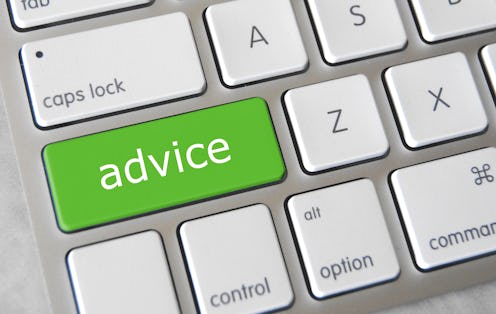
If you've ever felt the need to qualify your advice with the instructions "Do as I say, not as I do," you're not alone. According to psychologist Dan Ariely, who ironically is an advice columnist himself, people have trouble taking their own advice. Why? Because they're too close to their own lives to realize the advice applies. “When we are in a particular situation, we take lots of irrelevant factors into account,” he Ariely recently told The Cut for their "Advice Week" event. The same way an impressionistic painting may look like a blur of dots until we step back and realize it's a horse, all the nuances of our situation can block us from seeing it's the kind of situation we're constantly opining on.
Another psychologist, Hal Hershfield, related our hypocrisy about advice to the "fundamental attribution error" — our tendency to ascribe our behaviors to external circumstances and others' to internal traits, or, as he more colorfully puts it: "If I trip on the sidewalk, it must’ve been uneven... But if you trip, you’re clumsy." Instead of filing our own situations under the same categories we use to define others', we feel there is some extenuating circumstance that makes ours different. We're always the exception.
And we've all been there. We've all given people are least one of these pieces of guidance that we have not followed ourselves. So maybe we should try to do these things more often since, according to science at least, they apply to us more often they we realize.
1. "Just talk to them!"
I'm borrowing this one from The Cut's Melissa Dahl because it is too true. When friends complain to her about other people, she says, she thinks honesty is the best policy... until she's the one with the issue. Then, she realizes there's no "just" about it. But... but... confrontation is scary! How will the other person react? Could it spoil an otherwise drama-free friendship? Better to just sit here and bask in my own boiling blood.
2. "You should get that checked out."
No, but you see, this always happens to me because of my squeaky knee and imbalanced inner ear. (I just made up those terms. Do not now use them too.) Ariely asked participants in one study to imagine they've received a serious medical diagnosis. Most said they wouldn't ask for a referral out of fear of offending their doctor, but that they'd encourage someone else to get a second opinion. In my experience, this totally applies to first opinions as well. Other people can never be too careful; for me, that schlep to the doctor's office isn't worth it unless I'm literally afraid I'm dying.
3. "Remember tomorrow's another day."
Yes, yes it is, but it feels pretty shitty to be me today. You, on the other hand, only have five hours left in this day, which happens to actually last about 50 hours for me because of a glitch in space-time that didn't affect you.
4. "It would make a huge difference if you got more sleep."
This is true for most mortal humans, but my internal clock works according to a unique rhythm that activates my alertness in response to deadlines. So, as Jerry Seinfeld puts it, I'm going to go ahead and be "Night Guy" into the wee hours of the morning and let "Morning Guy" deal with the aftermath, thank you very much.
5. "There's no point dwelling on the past."
This is true in most cases, but perhaps if I just dwell a little longer, I could become the first person ever to go back in time and change the future. Sure, it's unlikely, but worth a shot, right? Don't worry about it yourself, though; I have bravely stepped up as the sole guinea pig in this time-travel experiment. Shh, you're interrupting my dwelling.
6. "You should just ask them out."
Thank you, but I'd rather be interrogated for murder than face a romantic rejection. But, pssh, you totally have a shot! Go get it, girl! And if they say no, that's their loss!
7. "Work-life balance increases your productivity."
Productivity drops off after 40 hours a week, you know... but maybe if I put in an extra 20 hours a week, that'll come out to a total of, like, 45 good hours. You should use that time to relax, though, because you're so worth it!
8. "So does getting organized."
Yeah, but getting organized also takes time, a resource that everyone except me has. Maybe if you can show me some scientific proof that I've gotten more work done after cleaning my room? The burden of proof is on everyone but me.
9. "Take your own advice."
Whoa, this just got meta. Other people should take their own advice because other people are too close to their own situations to notice when their own advice applies. But me? I've got it all figured out. I already know when my advice does and doesn't apply, thank you very much, so I am officially exempt from items 1-8.